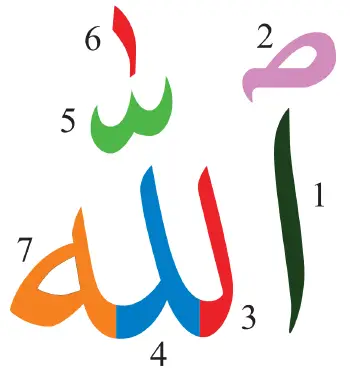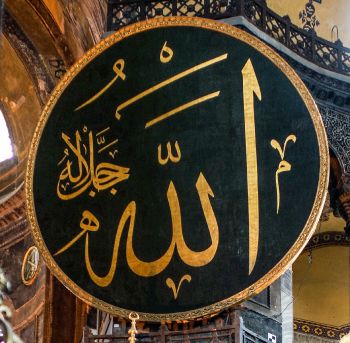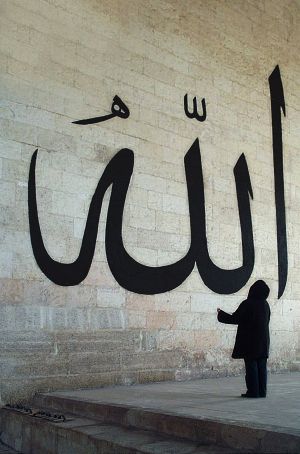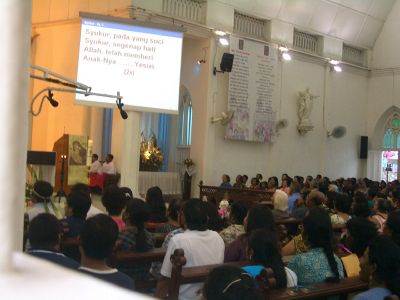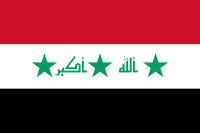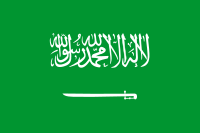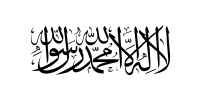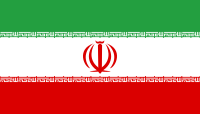Allah
Allah (Allah (/ˈæl.lə, ˈɑːl.lə, əˈl.lɑː/; Arabic: ٱللَّٰه, romanized: Allāh,) is the common Arabic word for God. In the English language, the word generally refers to God in Islam. The word is thought to be derived by contraction from al-ilāh, which means "the god," and is linguistically related to the Aramaic words Elah and Syriac ܐܲܠܵܗܵܐ (ʼAlāhā) and the Hebrew word El (Elohim) for God.
The word Allah has been used by Arabic people of different religions since pre-Islamic times. The pre-Islamic Arabs worshipped a supreme deity whom they called Allah, alongside other lesser deities. Muhammad used the word Allah to indicate the Islamic conception of God. Allah has been used as a term for God by Muslims (both Arab and non-Arab), Judaeo-Arabic-speaking Jews, and Arab Christians after the term "al-ilāh" and "Allah" were used interchangeably in Classical Arabic by the majority of Arabs who had become Muslims. It is also often, although not exclusively, used in this way by Bábists, Baháʼís, Mandaeans, Indonesian and Maltese Christians, and Sephardi Jews. Similar usage by Christians and Sikhs in Peninsular Malaysia has recently led to political and legal controversies.
Etymology
The etymology of the word Allāh has been discussed extensively by classical Arab philologists.[1] Grammarians of the Basra school regarded it as either formed "spontaneously" (murtajal) or as the definite form of lāh (from the verbal root lyh with the meaning of "lofty" or "hidden.")[1] Others held that it was borrowed from Syriac or Hebrew.
Most considered it to be derived from a contraction of the Arabic definite article al- and ilāh "deity, god" to al-lāh meaning "the deity, the God".[1] Indeed, there is "the interchangeability of al-ilāh and allāh in early Arabic poetry even when composed by the Christian ʿAdī ibn Zayd.[2]
The majority of modern scholars subscribe to the latter theory and view the loanword hypothesis with skepticism.[3]
The use of Allah as the name of a deity appears as early as the first century. An inscription using the Ancient South Arabian script in Old Arabic from Qaryat al-Fāw reads, "to Kahl and lh and ʿAththar (b-khl w-lh w-ʿṯr)."[2]
Cognates of the name "Allāh" exist in other Semitic languages, including Hebrew and Aramaic. The corresponding Aramaic form is ʼElāh (אלה), but its emphatic state is ʼElāhā (אלהא). It is written as ܐܠܗܐ (ʼĔlāhā) in Biblical Aramaic and ܐܲܠܵܗܵܐ (ʼAlāhā) in Syriac, both meaning simply "God."[4] The unusual Syriac form is likely an imitation of the Arabic.[2]
History of usage
Pre-Islamic Arabians
| Ancient Southwest Asian deities | |
| Levantine deities | |
|
Adonis | Anat | Asherah | Ashima | Astarte | Atargatis | Ba'al | Berith | Dagon | Derceto | El | Elyon | Eshmun | Hadad | Kothar | Mot | Qetesh | Resheph | Shalim | Yarikh | Yam |
|
| Mesopotamian deities | |
|
Adad | Amurru | An/Anu | Anshar | Asshur | Abzu/Apsu | Enki/Ea | Enlil | Ereshkigal | Inanna/Ishtar | Kingu | Kishar | Lahmu & Lahamu | Marduk | Mummu | Nabu | Nammu | Nanna/Sin | Nergal | Ningizzida | Ninhursag | Ninlil | Tiamat | Utu/Shamash | |
Regional variants of the word Allah occur in both pagan and Christian pre-Islamic inscriptions.[5] Different theories have been proposed regarding the role of Allah in pre-Islamic polytheistic cults. According to the Islamic scholar Ibn Kathir, Arab pagans considered Allah as an unseen God who created and controlled the Universe. Pagans believed worship of humans or animals who had lucky events in their life brought them closer to God. Pre-Islamic Meccans worshiped Allah alongside a host of lesser gods and those whom they called the "daughters of Allah."[6] Islam forbade worship of anyone or anything other than God.[7] Some authors have suggested that polytheistic Arabs used the name as a reference to a creator god or a supreme deity of their pantheon. The term may have been vague in the Meccan religion.[8]According to one hypothesis, which goes back to Julius Wellhausen, Allah (the supreme deity of the tribal federation around Quraysh) was a designation that consecrated the superiority of Hubal (the supreme deity of Quraysh) over the other gods. However, there is also evidence that Allah and Hubal were two distinct deities.[5] According to that hypothesis, the Kaaba was first consecrated to a supreme deity named Allah and then hosted the pantheon of Quraysh after their conquest of Mecca, about a century before the time of Muhammad. Some inscriptions seem to indicate the use of Allah as a name of a polytheist deity centuries earlier, but nothing precise is known about this use.[5] Some scholars have suggested that Allah may have represented a remote creator god who was gradually eclipsed by more particularized local deities.[9]There is disagreement on whether Allah played a major role in the Meccan religious cult. No iconic representation of Allah is known to have existed.[9][10] Allah is the only god in Mecca that did not have an idol.[11] Muhammad's father's name was ʿAbd-Allāh meaning "the slave of Allāh".[12]
Islam
In Islam, Allah is the unique, omnipotent and only deity and creator of the universe and is equivalent to God in other Abrahamic religions.[13] Allah is usually seen as the personal name of God, a notion which became disputed in contemporary scholarship, including the question, whether or not the word Allah should be translated as God.[14]
According to Islamic belief, Allah is the most common word to represent God,[12] and humble submission to his will, divine ordinances and commandments is the pivot of the Muslim faith. "He is the only God, creator of the universe, and the judge of humankind."[15] "He is unique (wāḥid) and inherently one (aḥad), all-merciful and omnipotent."[15] No human eyes can see Allah till the Day Of Judgment.[16] The Qur'an declares "the reality of Allah, His inaccessible mystery, His various names, and His actions on behalf of His creatures."[15] Allah does not depend on anything.[17] God is not a part of the Christian Trinity.[18] God has no parents and no children.[19]
The concept correlates to the Tawhid, where chapter 112 of the Qur'an (Al-'Ikhlās, The Sincerity) reads:
- SAY, God is one GOD;
- the eternal GOD:
- He begetteth not, neither is He begotten:
- and there is not any one like unto Him.[20]
and in the Ayat ul-Kursi the powerful ("Verse of the Throne"), which is the 255th verse in the longest chapter (the 2nd chapter) of the Qur'an, Al-Baqarah ("The Cow") states:
Allah! There is no deity but Him, the Alive, the Eternal.
Neither slumber nor sleep overtaketh Him.
Unto Him belongeth whatsoever is in the heavens and whatsoever is in the earth. Who could intercede in His presence without His permission?
He knoweth that which is in front of them and that which is behind them, while they encompass nothing of His knowledge except what He wills.
His throne includeth the heavens and the earth, and He is never weary of preserving them.
He is the Sublime, the Tremendous.
In Islamic tradition, there are 99 Names of God (al-asmā' al-ḥusná lit. meaning: 'the best names' or 'the most beautiful names'), each of which evoke a distinct characteristic of Allah.[13][21] All these names refer to Allah, the supreme and all-comprehensive divine name.[22] Among the 99 names of God, the most famous and most frequent of these names are "the Merciful" (ar-Raḥmān) and "the Compassionate" (ar-Raḥīm),[13][21] including the aforementioned al-Aḥad ("the One, the Indivisible") and al-Wāḥid ("the Unique, the Single").
Most Muslims use the untranslated Arabic phrase in shā’a llāh (meaning 'if God wills') after references to future events. Muslim discursive piety encourages beginning actions with the invocation of bi-smi llāh (meaning 'In the name of God').[23] There are certain phrases in praise of God that are favored by Muslims, including "Subḥāna llāh" (Glory be to God), "al-ḥamdu li-llāh" (Praise be to God), "lā ilāha illā llāh" (There is no deity but God) or sometimes "lā ilāha illā inta/ huwa" (There is no deity but You/ Him) and "Allāhu Akbar" (God is the Most Great) as a devotional exercise of remembering God (dhikr).
In a Sufi practice known as dhikr Allah (Arabic: ذكر الله, lit. "Remembrance of God"), the Sufi repeats and contemplates the name Allah or other associated divine names to Him while controlling his or her breath.[24] For example, in countless references in the context from the Qur'an:
- Allah is referred to in the second person pronoun in Arabic as "Anta (Arabic: أَنْتَ)" like the English "You", or commonly in the third person pronoun "Huwa (Arabic: َهُو)" like the English "He" and uniquely in the case pronoun of the oblique form "Hu/ Huw (Arabic: هو /-هُ)" like the English "Him" which rhythmically resonates. Considered a sacred sound, it is a chant or echo referring Allah as the "Absolute Breath or Soul of Life"—Al-Nafs al-Hayyah (Arabic: النّفس الحياة, an-Nafsu 'l-Ḥayyah)—notably among the 99 names of God, "the Giver of Life" (al-Muḥyī) and "the Bringer of Death" (al-Mumiyt);
- Allah is neither male or female (who has no gender), but who is the essence of the "Omnipotent, Selfless, Absolute Soul (an-Nafs, النّفس) and Holy Spirit" (ar-Rūḥ, الرّوح) - notably among the 99 names of God, "the All-Holy, All-Pure and All-Sacred" (al-Quddus);
- Allah is the originator of both before and beyond the cycle of creation, destruction and time - notably among the 99 names of God, "the First, Beginning-less" (al-Awwal), "the End/ Beyond ["the Final Abode"]/ Endless" (al-Akhir/ al-Ākhir) and "the Timeless" (aṣ-Ṣabūr.)
According to Gerhard Böwering, in contrast with pre-Islamic Arabian polytheism, God in Islam does not have associates and companions, nor is there any kinship between God and jinn.[12] Pre-Islamic pagan Arabs believed in a blind, powerful, inexorable and insensible fate over which man had no control. This was replaced with the Islamic notion of a powerful but provident and merciful God.[15]
According to Francis Edward Peters, "The Qur’ān insists, Muslims believe, and historians affirm that Muhammad and his followers worship the same God as the Jews (Template:Qref). The Qur’an's Allah is the same Creator God who covenanted with Abraham." Peters states that the Qur'an portrays Allah as both more powerful and more remote than Yahweh, and as a universal deity, unlike Yahweh who closely follows Israelites.[25]
Christianity
The Christian Arabs of today have no other word for "God" than "Allah."[26] Similarly, the Aramaic word for "God" in the language of Assyrian Christians is ʼĔlāhā, or Alaha. (Even the Arabic-descended Maltese language of Malta, whose population is almost entirely Catholic, uses Alla for "God.")
Arab Christians have used two forms of invocations that were affixed to the beginning of their written works. They adopted the Muslim bismillāh, and also created their own Trinitized bismillāh as early as the eighth century.[27] The Muslim bismillāh reads: "In the name of God, the Compassionate, the Merciful." The Trinitized bismillāh reads: "In the name of Father and the Son and the Holy Spirit, One God." The Syriac, Latin and Greek invocations do not have the words "One God" at the end. This addition was made to emphasize the monotheistic aspect of Trinitarian belief and also to make it more palatable to Muslims.[27]
According to Marshall Hodgson, in the pre-Islamic times some Arab Christians made pilgrimage to the Kaaba, a pagan temple at that time, honoring Allah there as God the Creator.[28]
Some archaeological excavation quests have led to the discovery of ancient pre-Islamic inscriptions and tombs made by Arab Christians in the ruins of a church at Umm el-Jimal in Northern Jordan, which initially, according to Enno Littman (1949), contained references to Allah as the proper name of God. However, on a second revision by Bellamy et al. (1985 & 1988) the 5-versed-inscription was re-translated as "(1)This [inscription] was set up by colleagues of ʿUlayh, (2) son of ʿUbaydah, secretary (3) of the cohort Augusta Secunda (4) Philadelphiana; may he go mad who (5) effaces it."[29]
The syriac word ܐܠܗܐ (ʼĔlāhā) can be found in the reports and the lists of names of Christian martyrs in South Arabia,[30]as reported by antique Syriac documents of the names of those martyrs from the era of the Himyarite and Aksumite kingdoms[31]
In pre-Islamic Gospels, the name used for God was "Allah," as evidenced by some discovered Arabic versions of the New Testament written by Arab Christians during the pre-Islamic era in Northern and Southern Arabia.[32] However most recent research in the field of Islamic studies assert that "all one can say about the possibility of a pre-Islamic, Christian version of the Gospel in Arabic is that no sure sign of its actual existence has yet emerged."[33][34] Additionally M. L. Hjälm in her most recent research (2017) inserts that "manuscripts containing translations of the gospels are encountered no earlier than the year 873."[35]
Irfan Shahîd quoting the tenth-century encyclopedic collection Kitab al-Aghani notes that pre-Islamic Arab Christians have been reported to have raised the battle cry "Ya La Ibad Allah" (O slaves of Allah) to invoke each other into battle. According to Shahid, on the authority of tenth-century Muslim scholar Al-Marzubani, "Allah" was also mentioned in pre-Islamic Christian poems by some Ghassanid and Tanukhid poets in Syria and Northern Arabia.[36]
Pronunciation
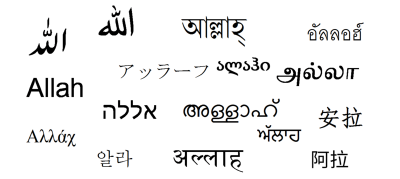
The word Allāh is generally pronounced [ɑɫˈɫɑː(h)], exhibiting a heavy lām, [ɫ], a velarized alveolar lateral approximant, a marginal phoneme in Modern Standard Arabic. Since the initial alef has no hamza, the initial [a] is elided when a preceding word ends in a vowel. If the preceding vowel is /i/, the lām is light, [l], as in, for instance, the Basmala.
As a loanword
English and other European languages
The history of the name Allāh in English was probably influenced by the study of comparative religion in the nineteenth century. Thomas Carlyle (1840) sometimes used the term Allah but without any implication that Allah was anything different from God. However, in his biography of Muḥammad (1934), Tor Andræ always used the term Allah, though he allows that this "conception of God" seems to imply that it is different from that of the Jewish and Christian theologies.[37]
Languages which may not commonly use the term Allah to denote God may still contain popular expressions which use the word. Because of the centuries long Muslim presence in the Iberian Peninsula, the word ojalá in the Spanish language and oxalá in the Portuguese language exist today, borrowed from Andalusi Arabic law šá lláh[38] similar to inshalla (Arabic: إِنْ شَاءَ ٱللَّٰهُ). This phrase literally means 'if God wills' (in the sense of "I hope so.")[39] The German poet Mahlmann used the form "Allah" as the title of a poem about the ultimate deity, though it is unclear how much Islamic thought he intended to convey.
Some Muslims leave the name "Allāh" untranslated in English, rather than using the English translation "God."[40] The word has also been applied to certain living human beings as personifications of the term and concept.[41]
Malaysian and Indonesian language


Christians in Malaysia and Indonesia use Allah to refer to God in the Malaysian and Indonesian languages (both of them standardized forms of the Malay language). Mainstream Bible translations in the language use Allah as the translation of Hebrew Elohim (translated in English Bibles as "God").[42] This goes back to early translation work by Francis Xavier in the sixteenth century.[43] The first dictionary of Dutch-Malay by Albert Cornelius Ruyl, Justus Heurnius, and Caspar Wiltens in 1650 (revised edition from 1623 edition and 1631 Latin edition) recorded Allah" as the translation of the Dutch word Godt.[44] Ruyl also translated the Gospel of Matthew in 1612 into the Malay language (an early Bible translation into a non-European language,[45] </ref> made a year after the publication of the King James Version[46], which was printed in the Netherlands in 1629. Then he translated the Gospel of Mark, published in 1638.[47]
The government of Malaysia in 2007 outlawed usage of the term Allah in any other but Muslim contexts. The use of Allah is not prohibited in the two Malaysian states of Sabah and Sarawak[48] where usage has been long-established and local Alkitab (Bibles) have been widely distributed freely in East Malaysia without restrictions for years where the laws differ from those in West Malaysia..[48]
Typography
The word Allāh is always written without an alif to spell the ā vowel. This is because the spelling was settled before Arabic spelling started habitually using alif to spell ā. However, in vocalized spelling, a small diacritic alif is added on top of the shaddah to indicate the pronunciation.
In the pre-Islamic Zabad inscription,[49] God is referred to by the term الاله , that is, alif-lam-alif-lam-ha. This presumably indicates Al-'ilāh = "the god", without alif for ā.
Many Arabic type fonts feature special ligatures for Allah.[50]
Since Arabic script is used to write other texts othe than the Koran, rendering lām + lām + hā’ as the previous ligature is considered faulty which is the case with most common Arabic typefaces.
Unicode
Unicode has a code point reserved for Allāh, <templatestyles src="Script/styles_arabic.css" />ﷲ = U+FDF2, in the Arabic Presentation Forms-A block, which exists solely for "compatibility with some older, legacy character sets that encoded presentation forms directly";[51] this is discouraged for new text. Instead, the word Allāh should be represented by its individual Arabic letters, while modern font technologies will render the desired ligature.
The calligraphic variant of the word used as the emblem of Iran is encoded in Unicode, in the Miscellaneous Symbols range, at code point U+262B (☫). The flags that include the word are also present in the regional indicator symbols of Unicode: 🇮🇶, 🇸🇦, 🇦🇫, 🇮🇷, 🇺🇿.
National flags with "Allah" written on them
Notes
- ↑ 1.0 1.1 1.2 D.B. Macdonald, "Ilah," in Encyclopedia of Islam, Vol. 3, 2nd ed., ed. Umair Mirza (Leiden, ND: Brill, 1986), 1093. Retrieved February 28, 2024.
- ↑ 2.0 2.1 2.2 Nicholas Sinai, Rain-Giver, Bone-Breaker, Score-Settler: Allāh in Pre-Quranic Poetry (Atlanta, GA: American Oriental Society, 2019, ISBN 978-1948488259), 7-8, 12.
- ↑ Gerhard Böwering, Encyclopedia of the Quran, Vol. 2, (Leiden, ND: Brill, 2002, ISBN 978-9004147430), 318.
- ↑ "Entry for "ʼlh," The Comprehensive Aramaic Lexicon. Retrieved February 27, 2024.
- ↑ 5.0 5.1 5.2 Christian Julien Robin, "Arabia and Ethiopia," in The Oxford Handbook of Late Antiquity (New York, N.Y.: Oxford University Press, 2012, ISBN 978-0195336931), 304-305. Retrieved February 20, 2024.
- ↑ Anthony S. Mercatante and James R. Dow, "Allah," in The Facts on File Encyclopedia of World Mythology and Legend (New York, N.Y.: Facts on File, 2004, ISBN 978-1438126852), 53.
- ↑ IslamKotob, Tafsir Ibn Kathir all 10 volumes IslamKotob. Retrieved February 20, 2024.
- ↑ Louis Gardet, "Allah," in Encyclopaedia of Islam, Second Ed., eds. P. Bearman, Th. Bianquis, C.E. Bosworth, E. van Donzel, W.P. Heinrichs (Leiden, ND: Brill Online, 2012, ISBN 978-9004161214). Retrieved February 20, 2024.
- ↑ 9.0 9.1 Jonathan Porter Berkey, The Formation of Islam: Religion and Society in the Near East, 600-1800 (Cambridge, U.K.: Cambridge University Press, 2003, ISBN 978-0521588133), 42.
- ↑ Francis E. Peters, Muhammad and the Origins of Islam (Albany, N.Y.: SUNY Press, 1994, ISBN 978-0791418758), 107. Retrieved February 27, 2024.
- ↑ "Allah," in The Oxford Dictionary of Islam. Ed. John L. Esposito (Oxford, U.K.: Oxford University Press, 2004, ISBN 978-0195125597).
- ↑ 12.0 12.1 12.2 Böwering, Gerhard, "God and His Attributes," in Encyclopaedia of the Qurʼān (Leiden, ND: Brill, 2007).
- ↑ 13.0 13.1 13.2 "Allah," in Encyclopedia of the Modern Middle East and North Africa, 2nd. ed. (New York, N.Y.: Macmillan Reference USA, 2004, ISBN 978-0028657691).
- ↑ Andreas Görke and Johanna Pink, eds., Tafsir and Islamic Intellectual History Exploring the Boundaries of a Genre (London, U.K.: Oxford University Press in association with The Institute of Ismaili Studies, 2015, ISBN 978-0198702061), 478.
- ↑ 15.0 15.1 15.2 15.3 Asma Afsaruddin, "Allah," in Encyclopædia Britannica, 2007. Retrieved February 27, 2024.
- ↑ "The Quranic Arabic Corpus - Chapter 6, Verse 103," www.corpus.quran.com. Retrieved February 28, 2024.
- ↑ "112. Surah Al-Ikhlaas or At-Tauhid," NobleQuran.com. Retrieved February 28, 2024.
- ↑ "The Quranic Arabic Corpus - Chapter 5, Verse 73," www.corpus.quran.com. Retrieved February 28, 2024.
- ↑ "The Quranic Arabic Corpus - Chapter 112, Verse 3," www.corpus.quran.com. Retrieved February 28, 2024.
- ↑ Muhammad, The Koran trans. George Sale. Retrieved February 20, 2024.
- ↑ 21.0 21.1 David Bentley, The 99 Beautiful Names for God for All the People of the Book (Pasadena, CA: William Carey Library, 1999, ISBN 978-0878082995).
- ↑ Sachiko Murata, The Tao of Islam : a sourcebook on gender relationships in Islamic thought (Albany, N.Y.: SUNY Press, 1992, ISBN 978-0791409145).
- ↑ Carolyn Fluehr-Lobban, Islamic Society in Practice (Gainesville, FL: University Press of Florida, 1994, ISBN 978-0813013053), 24.
- ↑ Carl W. Ernst and Bruce B. Lawrence, Sufi Martyrs of Love: The Chishti Order in South Asia and Beyond (London, U.K.: Macmillan, 2002, ISBN 978-1403960276), 29.
- ↑ F.E. Peters, Islam: A Guide for Jews and Christians (Princeton, N.J.: Princeton University Press, 2003, ISBN 978-0691122335), 4.
- ↑ Bernard Lewis, P. M. Holt, Peter R. Holt, and Ann Katherine Swynford Lambton, The Cambridge history of Islam (Cambridge, U.K.: Cambridge University Press, 1977, ISBN 978-0521291354), 32.
- ↑ 27.0 27.1 Thomas E. Burman, Religious Polemic and the Intellectual History of the Mozarabs (Leiden, ND: Brill, 1994, ISBN 978-9004099104), 103.
- ↑ Marshall G. S. Hodgson, The Venture of Islam: Conscience and History in a World Civilization (Chicago, IL: University of Chicago Press, 1974, ISBN 978-0226346779), 156.
- ↑ James Bellamy, "Two Pre-Islamic Arabic Inscriptions Revised: Jabal Ramm and Umm al-Jimal," Journal of the American Oriental Society, 108(3) (1988): 372–378.
- ↑ "The Himyarite Martyrs (text)," New Handbook of Syriac Literature. Retrieved February 21, 2024.
- ↑ Ignatius Ya`qub III, The Arab Himyarite Martyrs in the Syriac Documents (1966), 9-65-66-89. Retrieved February 28, 2024.
- ↑ Frederick V. Winnett, "Allah before Islam," The Moslem World 28(3) (1938): 239–248.
- ↑ Sidney H Griffith, "The Gospel in Arabic: An Enquiry into Its Appearance in the First Abbasid Century," Oriens Christianus 69 (1985): 166.
- ↑ David D. Grafton, "The identity and witness of Arab pre-Islamic Arab Christianity: The Arabic language and the Bible," HTS: Theological Studies 70(1) (2014). "Christianity [...] did not penetrate into the lives of the Arabs primarily because the monks did not translate the Bible into the vernacular and inculcate Arab culture with biblical values and tradition. Trimingham's argument serves as an example of the Western Protestant assumptions outlined in the introduction of this article. It is clear that the earliest Arabic biblical texts can only be dated to the ninth century at the earliest, that is after the coming of Islam.
- ↑ M. L. Hjälm, Senses of Scripture, Treasures of Tradition, The Bible in Arabic among Jews, Christians and Muslims (Biblia Arabica) (Leiden, ND: Brill, 2017, ISBN 978-9004347168). "By contrast, manuscripts containing translations of the gospels are encountered no earlier then the year 873." (Ms. Sinai. N.F. parch. 14 & 16).
- ↑ Irfan Shahîd, Byzantium and the Arabs in the Fourth Century (Washington, D.C.: Dumbarton Oaks Trustees for Harvard University, 1984, ISBN 978-0884021162), 418, 452.
- ↑ William Montgomery Watt, Islam and Christianity today: A Contribution to Dialogue (London, U.K.: Routledge, 1983, ISBN 978-0710097668), 45.
- ↑ "ojalá," in Diccionario de la lengua española - ASALE, 23rd ed. (Madrid, ES: Real Academia Española - ASALE, 2022, Retrieved Feburary 28, 2024.
- ↑ Luce López Baralt, Islam in Spanish Literature: From the Middle Ages to the Present (Leiden, ND: Brill, 1992, ISBN 978-9004094604), 25.
- ↑ F. E. Peters, The Monotheists: Jews, Christians, and Muslims in Conflict and Competition, Volume I: The Peoples of God (Princeton, N.J.: Princeton University Press, 2003, ISBN 978-0691114606), 12.
- ↑ "A history of Clarence 13X and the Five Percenters, referring to Clarence Smith as Allah," Final Call, March 21, 2007. Retrieved February 28, 2024.
- ↑ "Usage of the word "Allah" from Matthew 22:32 in Indonesian bible versions (parallel view) as old as 1733," Alkitab Sabda. Retrieved February 28, 2024.
- ↑ James M. Sneddon, The Indonesian Language: Its History and Role in Modern Society (Sydney, AU: University of New South Wales Press, 2004, ISBN 978-0868405988).
- ↑ Justus Heurnius, Albert Ruyl, Caspar Wiltens.Vocabularium ofte Woordenboeck nae ordre van den alphabeth in 't Duytsch en Maleys (ghedruckt door ordre van de E.E. heeren bewinthehebberen der Geoctroyeerde Oost-Indische Compagnie, 1650), 65. Retrieved February 27, 2024.
- ↑ But compare: Paulos Milkias, "Ge'ez Literature (Religious)," in Ethiopia (Santa Barbara, CA: ABC-CLIO, 2011, ISBN 978-1598842579), 299. Retrieved February 28, 2018. "Monasticism played a key role in the Ethiopian literary movement. The Bible was translated during the time of the Nine Saints in the early sixth century [...].
- ↑ John Barton, The Biblical World (Oxford, U.K.: Routledge, 2002, ISBN 978-0415275743).
- ↑ "Sejarah Alkitab Indonesia / Albert Conelisz Ruyl," www.sejarah.sabda.org. Retrieved February 21, 2024.
- ↑ 48.0 48.1 "Catholic priest should respect court: Mahathir," Daily Express, January 9, 2014. Retrieved February 27, 2024.
- ↑ "Zebed Inscription: A Pre-Islamic Trilingual Inscription In Greek, Syriac & Arabic From 512 C.E.," Islamic Awareness, November 13, 2017. Retrieved February 27, 2024.
- ↑
- "Arabic fonts and Mac OS X," Retrieved February 28, 2024.
- "Programs for Arabic in Mac OS X," Retrieved February 28, 2024.
- ↑ "FAQ - Middle East Scripts," The Unicode Consortium. Retrieved February 21, 2024.
ReferencesISBN links support NWE through referral fees
- Afsaruddin, Asma. "Allah," in Encyclopædia Britannica, 2007. Retrieved February 27, 2024.
- Baralt, Luce López. Islam in Spanish Literature: From the Middle Ages to the Present. Leiden, ND: Brill, 1992. ISBN 978-9004094604
- Barton, John. The Biblical World. Oxford, U.K.: Routledge, 2002. ISBN 978-0415275743
- Bellamy, James. "Two Pre-Islamic Arabic Inscriptions Revised: Jabal Ramm and Umm al-Jimal," Journal of the American Oriental Society, 108(3) (1988): 372–378.
- Bentley, David. The 99 Beautiful Names for God for All the People of the Book. Pasadena, CA: William Carey Library, 1999. ISBN 978-0878082995
- Berkey, Jonathan Porter. The Formation of Islam: Religion and Society in the Near East, 600-1800. Cambridge, U.K.: Cambridge University Press, 2003. ISBN 978-0521588133
- Böwering,Gerhard. Encyclopedia of the Quran, Vol. 2. Leiden, ND: Brill, 2002. ISBN 978-9004147430
- Burman, Thomas E. Religious Polemic and the Intellectual History of the Mozarabs. Leiden, ND: Brill, 1994. ISBN 978-9004099104
- Ernst, Carl W., and Bruce B. Lawrence. Sufi Martyrs of Love: The Chishti Order in South Asia and Beyond. London, U.K.: Macmillan, 2002. ISBN 978-1403960276
- Esposito, John L. "Allah," in The Oxford Dictionary of Islam. Oxford, U.K.: Oxford University Press, 2004. ISBN 978-0195125597
- Fluehr-Lobban, Carolyn. Islamic Society in Practice. Gainesville, FL: University Press of Florida, 1994. ISBN 978-0813013053
- Gardet, Louis. "Allah," in Encyclopaedia of Islam, Second Edition. Eds. P. Bearman, Th. Bianquis, C.E. Bosworth, E. van Donzel, W.P. Heinrichs. Leiden, ND: Brill Online, 2012. ISBN_978-9004161214
- Görke, Andreas, and Johanna Pink (eds.). Tafsir and Islamic Intellectual History Exploring the Boundaries of a Genre. London, U.K.: Oxford University Press in association with The Institute of Ismaili Studies, 2015. ISBN 978-0198702061
- Grafton, David D. "The identity and witness of Arab pre-Islamic Arab Christianity: The Arabic language and the Bible," HTS: Theological Studies 70(1) (2014).
- Griffith, Sidney H. "The Gospel in Arabic: An Enquiry into Its Appearance in the First Abbasid Century," Oriens Christianus 69 (1985): 166.
- Gruendler, Beatrice. The Development of the Arabic Scripts: From the Nabatean Era to the First Islamic Century according to Dated Texts. Atlanta, GA: Scholars Press, 1993. ISBN 978-1555407100
- Heurnius, Justus, Albert Ruyl, and Caspar Wiltens. Vocabularium ofte Woordenboeck nae ordre van den alphabeth in 't Duytsch en Maleys (ghedruckt door ordre van de E.E. heeren bewinthehebberen der Geoctroyeerde Oost-Indische Compagnie, 1650), 65. Retrieved February 27, 2024.
- Hjälm, M.L. Senses of Scripture, Treasures of Tradition, The Bible in Arabic among Jews, Christians and Muslims (Biblia Arabica). Leiden, ND: Brill, 2017. ISBN 978-9004347168
- Hodgson, Marshall G.S. The Venture of Islam: Conscience and History in a World Civilization. Chicago, IL: University of Chicago Press, 1974. ISBN 978-0226346779
- IslamKotob. Tafsir Ibn Kathir all 10 volumes IslamKotob. Retrieved February 20, 2024.
- Lewis, Bernard, P. M. Holt, Peter R. Holt, and Ann Katherine Swynford Lambton. The Cambridge history of Islam. Cambridge, U.K.: Cambridge University Press, 1977. ISBN 978-0521291354
- Macdonald, D.B. "Ilah," in Encyclopedia of Islam, Vol. 3, 2nd ed. ed. Umair Mirza. Leiden, ND: Brill, 1986. Retrieved February 28, 2024.
- Mercatante, Anthony S., and James R. Dow. "Allah," in The Facts on File Encyclopedia of World Mythology and Legend. New York, NY: Facts on File, 2004. ISBN 978-1438126852
- Milkias, Paulos. "Ge'ez Literature (Religious)," in Ethiopia. Santa Barbara, CA: ABC-CLIO, 2011. ISBN 978-1598842579
- Muhammad. The Koran trans. George Sale. Retrieved February 20, 2024.
- Murata, Sachiko. The Tao of Islam : a sourcebook on gender relationships in Islamic thought. Albany, NY: SUNY Press, 1992. ISBN 978-0791409145
- Peters, Francis E. Muhammad and the Origins of Islam. Albany, NY: SUNY Press, 1994. ISBN 978-0791418758
- Peters, F.E. Islam: A Guide for Jews and Christians. Princeton, NJ: Princeton University Press, 2003. ISBN 978-0691122335
- Peters, F.E. The Monotheists: Jews, Christians, and Muslims in Conflict and Competition, Volume I: The Peoples of God. Princeton, NJ: Princeton University Press, 2003. ISBN 978-0691114606
- Robin, Christian Julien. "Arabia and Ethiopia," In The Oxford Handbook of Late Antiquity. New York, NY: Oxford University Press, 2012. ISBN 978-0195336931
- Shahîd, Irfan. Byzantium and the Arabs in the Fourth Century. Washington, DC: Dumbarton Oaks Trustees for Harvard University, 1984. ISBN 978-0884021162
- Sinai, Nicholas. Rain-Giver, Bone-Breaker, Score-Settler: Allāh in Pre-Quranic Poetry. Atlanta, GA: American Oriental Society, 2019. ISBN 978-1948488259
- Sneddon, James M. The Indonesian Language: Its History and Role in Modern Society. Sydney, AU: University of New South Wales Press, 2004. ISBN 978-0868405988
- Watt, William Montgomery. Islam and Christianity today: A Contribution to Dialogue. London, U.K.: Routledge, 1983. ISBN 978-0710097668
- Winnett, Frederick V. "Allah before Islam," The Moslem World 28(3) (1938): 239–248.
- Ya`qub III, Ignatius. The Arab Himyarite Martyrs in the Syriac Documents (1966), 9-65-66-89. Retrieved February 28, 2024.
- "Allah," in Encyclopedia of the Modern Middle East and North Africa, 2nd. edition. New York, NY: Macmillan Reference USA, 2004. ISBN 978-0028657691
External links
All links retrieved February 7, 2024.
- Names of Allah with Meaning on Website, Flash, and Mobile Phone Software
- Concept of God (Allah) in Islam
- Allah, the Unique Name of God
- "The Himyarite Martyrs (text)," New Handbook of Syriac Literature.
- "Sejarah Alkitab Indonesia / Albert Conelisz Ruyl," www.sejarah.sabda.org.
- "Bahasa Malaysia Bibles: The Cabinet's 10-point solution," Aliran, January 25, 2014.
- "FAQ - Middle East Scripts," The Unicode Consortium.
- "Entry for "ʼlh," The Comprehensive Aramaic Lexicon.
- "Zebed Inscription: A Pre-Islamic Trilingual Inscription In Greek, Syriac & Arabic From 512 C.E.," Islamic Awareness, November 13, 2017.
- "ojalá," in Diccionario de la lengua española - ASALE, 23rd ed. (Madrid, ES: Real Academia Española - ASALE, 2022.
- "Usage of the word "Allah" from Matthew 22:32 in Indonesian bible versions (parallel view) as old as 1733," Alkitab Sabda.
- "Flags, Symbols & Currency of Uzbekistan," World Atlas.
- "Arabic fonts and Mac OS X,"
- "Programs for Arabic in Mac OS X,"
- "112. Surah Al-Ikhlaas or At-Tauhid," NobleQuran.com.
- "The Quranic Arabic Corpus - Chapter 6, Verse 103," www.corpus.quran.com.
- "The Quranic Arabic Corpus - Chapter 5, Verse 73," www.corpus.quran.com.
- "The Quranic Arabic Corpus - Chapter 112, Verse 3," www.corpus.quran.com.
- Typography
- Arabic Fonts and Mac OS X
- Programs for Arabic in Mac OS X
- "About the Unicode Standard Version 5.0 Book,"
Credits
New World Encyclopedia writers and editors rewrote and completed the Wikipedia article in accordance with New World Encyclopedia standards. This article abides by terms of the Creative Commons CC-by-sa 3.0 License (CC-by-sa), which may be used and disseminated with proper attribution. Credit is due under the terms of this license that can reference both the New World Encyclopedia contributors and the selfless volunteer contributors of the Wikimedia Foundation. To cite this article click here for a list of acceptable citing formats.The history of earlier contributions by wikipedians is accessible to researchers here:
The history of this article since it was imported to New World Encyclopedia:
Note: Some restrictions may apply to use of individual images which are separately licensed.

